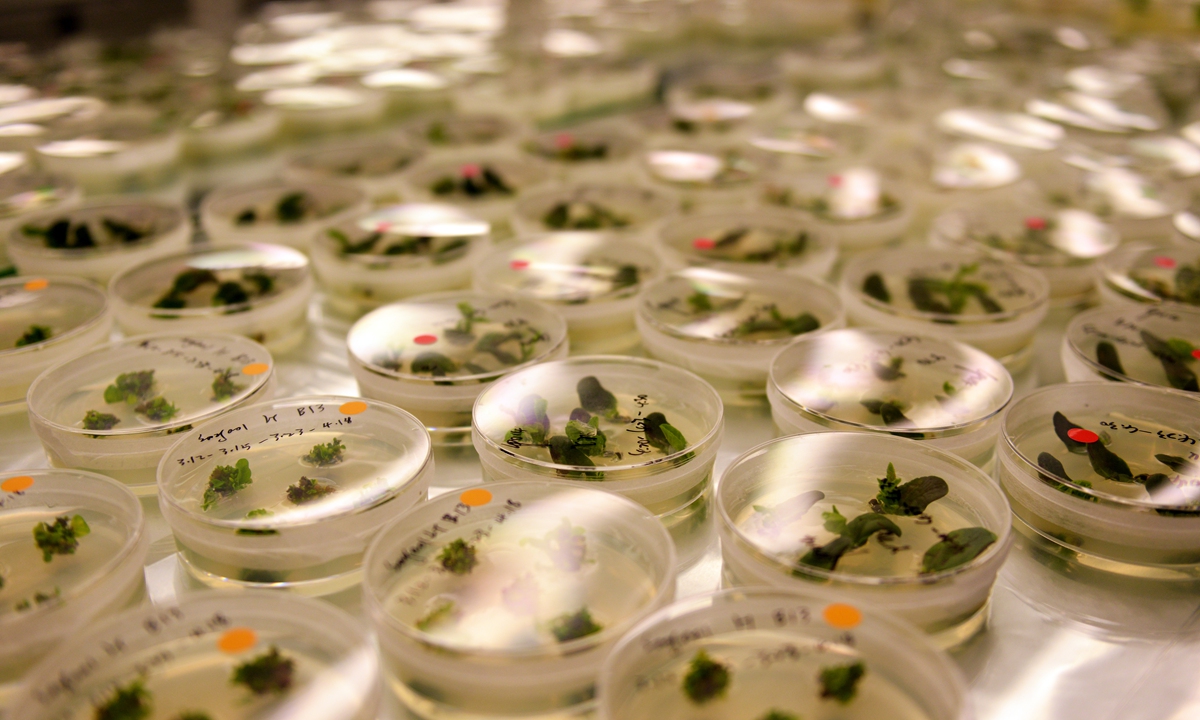
Soybean seeds undergoing genetic modification experiments in a lab at Longping Biotechnology (Hainan) Co in Sanya, South China's Hainan Province. Photo: Zhao Juecheng/GT
China's central government will soon release an action plan for revitalizing the agricultural seeds sector, which is the second such plan in 60 years. Analysts said the move is a milestone in the history of China's seeds industry, indicating that China attaches greater importance to agricultural security and will treat it as a national security issue.The action plan, which was approved by the central government in July, is the second of its kind after the Decision on Strengthening Seed Work, released in 1962.
The plan has made clear the overall goal of being self-reliant in seed technologies and having control of seeds sources, according to a signed article by Minister of Agriculture and Rural Affairs Tang Renjian published on Wednesday.
Analysts said that it is necessary to have independent cultivation technology for seeds to completely change the nation's import dependence for seeds and food, which will help maintain grain price stability.
China has diverse agricultural ecosystems and a rich range of species. Some regions have abundant germplasm resources as well as strong research and development capabilities, while other regions are big seed producers and users, according to Tang.
The minister also said that regions should first be clear about their resources and then make development plans based on their advantages, demand and potential.
The action plan aims to better develop the nation's seeds sector and related technologies while utilizing market resources more efficiently and promptly, Li Guoxiang, a research fellow at the Chinese Academy of Social Sciences, told the Global Times on Wednesday.
Li noted the difficulties for China to obtain some advanced technologies or seed resources overseas due to complex changes in international relations.
Seed sources in agriculture are equivalent to chips in manufacturing. Therefore, it is a relatively high risk for China to be heavily reliant on foreign seed sources amid a complex global situation, Wang Zuli, deputy researcher at the Institute of Agricultural Economics and Development at the Chinese Academy of Agricultural Sciences, told the Global Times on Wednesday.
Wang explained that China has a high degree of external reliance on seeds and other genetic resources for food crops, as well as breeding of some high-quality livestock such as white feather chickens.
For instance, China imported 11.3 million tons of corn in 2020, of which 233.3 tons were used for seeds, according to statistics from customs.
"It is crucial to ensure the security of China's agricultural industry by improving its ability to undertake independent research and development of seeds resources and avoid seeds resources becoming a bottleneck issue for the industry, which might be targeted by some countries," said Wang.
The adverse impact of the COVID-19 pandemic on supply chains has led countries to strengthen national food security strategies and restrict or ban some cross-border food trade, which analysts said has imposed more pressure on China's food supply.
China has rolled out support policies and projects such as recruiting more professional talent to improve the level of scientific research in agriculture. Cooperation between private enterprises and research institutions has also been encouraged to commercialize scientific findings.
The action plan proposed to further strengthen the construction of seed breeding bases, such as a corn base in Northwest China's Gansu Province, a rice base in Southwest China's Sichuan Province, and a soybean seed base in Northeast China's Heilongjiang Province.
In terms of livestock, the plan calls for building bases and farms targeting animals like hogs, cows, sheep and hens, while supporting the construction of national-level aquatic product bases.
An agriculture analyst surnamed Ma said that previously, China did not pay enough attention to food security.
"Enterprises were more willing to pursue economic benefits and import cheaper food, which led to a vicious circle for the development of the domestic food and seed industry," Ma told the Global Times on Wednesday.
Domestic food is more expensive than imported food, which is mainly due to China's outdated farming technology. As imports rise, local production falls - but it then becomes more and more difficult for the domestic food sector to achieve economies of scale.
Last year, China imported a record amount of food, and that situation continued in the first half of the year. First-half grain imports stood at 843.6 million tons, up 43.1 percent year-on-year, according to customs.






